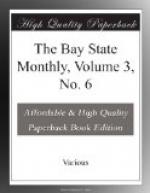Immediately after graduation Mr. Paine was appointed a Tutor of Waterville College, and discharged the duties of that office for a year. He then began the study of law in the office of his uncle, the late Samuel S. Warren, of China, Maine, and continued the study in the office of William Clark, a noted lawyer in Hallowell, Maine, and, for a year, in the Law School of Harvard University, where he was the classmate of Charles Sumner, Wendell Phillips and B.F. Thomas. In the autumn of 1834, he was admitted to the bar of Kennebec County, Maine. Beginning his professional career at Hallowell, he prosecuted it there with signal success till the summer of 1854, having for twenty years a practice not surpassed by that of any member of the Maine bar. During the sessions of 1836, 1837, and again in that of 1853, he represented the citizens of Hallowell in the lower house of the State Legislature. He was also for five years Attorney for Kennebec County. During his stay in Maine, he was repeatedly offered a seat on the bench of the Supreme Judicial Court of that State; but, having an unconquerable aversion to office of every kind, civil or political, he declined to accept the honor pressed upon him. In 1853 he was offered by his political friends, then the dominant party in the Legislature, a seat in the United States Senate; but he refused to be nominated. In the summer of 1854, in accordance with a long cherished resolve, which he had been prevented from executing before by a promise to his father that he would not leave Maine during that parent’s lifetime, he removed to Cambridge, Mass., and opened a law-office in Boston. Here he at once entered upon a large and lucrative practice, both in the State and Federal courts, which kept steadily increasing for over twenty years, till declining health and partial deafness compelled him to withdraw from the courts of justice, and confine himself to office business. During this period, his opinion on abstruse and knotty points of law was often solicited by eminent counsel living outside of Massachusetts, and he sent written opinions to attorneys in nine different states. As Referee and Master in Chancery, he was called upon to arbitrate in a great number of difficult and complicated cases, involving the ownership and disposition of large amounts of property. His decisions in these vexed cases, which often involved the unravelling of tangled webs of testimony, and the consideration of the nicest and most delicate questions of law, were luminous and masterly, and so impartial withal, that the litigants must have often been convinced of their justness, if not contented,—etaim contra quos statuit, aequos placatosque dimisit.




